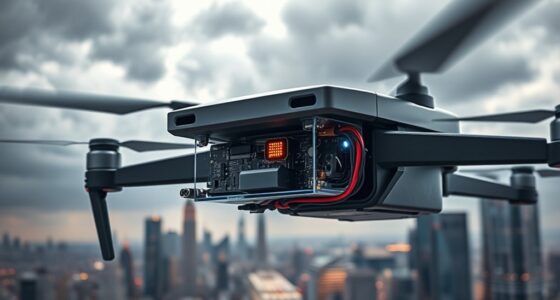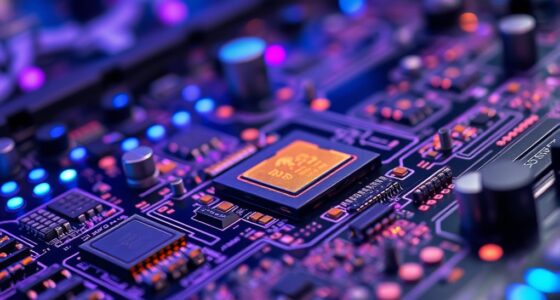As you go about your daily routine, you're likely unaware that the objects surrounding you, from the furniture to the accessories, may soon be transformed into intelligent, AI-powered surveillance tools, courtesy of smart dust technology. This innovation enables everyday objects to detect vibrations, temperature, and light changes, making them capable of monitoring your daily activities. Privacy advocates are alarmed, as this technology risks unauthorized data collection, sensor privacy breaches, and personal information misuse. While smart dust has the potential to revolutionize environmental and infrastructure management, its implementation raises significant concerns – and it's essential you understand the implications of this emerging technology.
Key Takeaways
- AI-powered smart dust enables pervasive surveillance, transforming everyday objects into monitoring tools, sparking significant privacy concerns.
- Smart dust devices can collect vast amounts of personal data without user consent, posing risks of data breaches and misuse.
- Integration of smart dust with IoT creates comprehensive profiles of individual behaviors, exacerbating privacy and surveillance concerns.
- Current regulatory frameworks are inadequate to address the unique challenges posed by autonomous sensors, necessitating urgent development of protective laws.
AI-Powered Surveillance State
As you go about your daily routine, you're being surrounded by an invisible network of sensors that could be monitoring your every move, sparking concerns about the emergence of an AI-powered surveillance state.
With the integration of smart dust technology, the risk of unauthorized data collection and surveillance increases. These tiny sensors can collect data on various environmental factors, including sound and movement, enabling pervasive monitoring that transforms everyday objects into surveillance tools.
This raises significant privacy concerns, as individuals may be unaware of when they're being observed or recorded. The potential for misuse by malicious actors compounds these concerns, making it vital to establish ethical guidelines for the deployment of smart dust technology.
As smart dust becomes more prevalent, the line between public safety and individual privacy will continue to blur. It's important to address these concerns and guarantee that this technology is used responsibly, without compromising our right to privacy.
Smart Dust Capabilities and Concerns

You're likely to be surprised by the vast range of capabilities packed into smart dust, which can detect everything from subtle vibrations to changes in temperature and light. These tiny devices, consisting of microelectromechanical systems (MEMS), can collect and process data in real-time, and even store it onboard. They can then wirelessly communicate with cloud services or base stations, making the data accessible from anywhere.
Some of the key capabilities of smart dust include:
- Environmental monitoring: tracking temperature, humidity, and light levels
- Infrastructure monitoring: identifying weaknesses in buildings and bridges
- Agricultural monitoring: tracking crop conditions and soil health
However, with these capabilities come significant concerns. The small size and undetectable nature of smart dust raise privacy concerns, as it can be used for unauthorized surveillance.
Additionally, the high implementation costs of smart dust technology pose a challenge for widespread adoption. As smart dust becomes more prevalent, it's crucial to reflect on the ethical implications of its use and guarantee that it's implemented in a way that respects individual privacy.
Privacy in the Age of IoT

As you consider the integration of smart dust into your daily life, you're probably wondering how these tiny sensors will impact your privacy.
You're right to be concerned, since smart dust devices can collect vast amounts of data on you and your environment without your knowledge or consent.
The risks of data surveillance, sensor privacy breaches, and invisible monitoring threats are very real, and it's crucial to understand these concerns before embracing this technology.
Data Surveillance Concerns
Walking into a public space or even your own home, you're suddenly surrounded by an invisible network of tiny sensors, known as smart dust, that can silently monitor your every move. This technology, comprised of microelectromechanical systems (MEMS), raises significant concerns about privacy and surveillance.
Unauthorized recording and surveillance become increasingly possible with smart dust devices that are small enough to be undetectable.
Extensive data collection capabilities can lead to misuse of personal information, exacerbating data privacy and security issues.
Integration with the Internet of Things (IoT) enables multiple devices to communicate and share data, creating a thorough profile of individual behaviors and preferences without explicit consent.
Current regulatory frameworks may not adequately protect individuals from intrusive surveillance practices, highlighting the urgent need for new laws to address the implications of smart dust technology on privacy.
As you go about your daily life, you're likely being monitored and tracked without your knowledge or consent.
The potential for abuse is vast, and it's crucial to address these concerns before smart dust becomes ubiquitous.
Sensor Privacy Risks
Your daily routine is now susceptible to persistent monitoring, as the proliferation of smart dust sensors in IoT devices raises alarming privacy risks in the age of ubiquitous surveillance.
These tiny sensors can operate undetectably, collecting your personal information without your consent or knowledge. The ease with which smart dust can be deployed means you may be unaware of the extent of the monitoring technology surrounding you.
This leads to significant privacy concerns, as unauthorized surveillance can have far-reaching consequences. The security measures integrated into smart dust systems are often inconsistent, relying on the discretion of the installer, which can put your personal data at risk.
The lack of robust ethical guidelines and regulations exacerbates these concerns, highlighting the need for urgent action. As IoT devices become increasingly pervasive, it's crucial to address the regulatory challenges posed by smart dust.
You deserve to have control over your personal information, and it's time for policymakers to take action to guarantee responsible usage and protection of your data.
Invisible Monitoring Threats
Frequently, you're being monitored without even realizing it, as the pervasive presence of smart dust sensors in IoT devices quietly collects your personal data, often without your knowledge or consent. This invisible monitoring threat raises significant privacy concerns, as these tiny sensors can operate undetectably, leading to unauthorized data collection and surveillance of individuals and environments.
Here are some alarming facts about smart dust:
- Undetectable surveillance: Smart dust's compact size and wireless communication capabilities make it challenging to regulate and control, complicating efforts to safeguard against misuse and unauthorized data access.
- Sensitive information gathering: Smart dust can gather sensitive information on acceleration, temperature, and other personal activities without consent.
- Increased data breach risks: As smart dust becomes integrated into the IoT, the risk of data breaches and exploitation of collected information increases, posing threats to individual privacy and civil liberties.
The invisible monitoring threats posed by smart dust demand immediate attention and action to safeguard individual privacy and prevent misuse.
Ethics of Ambient Intelligence

As you explore the domain of ambient intelligence, you're likely to encounter concerns about surveillance and privacy.
With AI-powered smart dust capable of collecting vast amounts of data, you'll need to contemplate the implications of autonomous data collection on your personal autonomy.
Can you trust that your private moments won't be monitored or recorded without your knowledge or consent?
Surveillance and Privacy Concerns
With the widespread adoption of smart dust technology, you're likely to find yourself unknowingly surrounded by undetectable sensors that can record your personal data without your consent, sparking significant surveillance and privacy concerns. As you go about your daily life, you may be unaware that smart dust devices are collecting your personal information, raising ethical implications about unauthorized monitoring and data collection.
Here are some alarming aspects of smart dust technology:
- Undetectable surveillance: Smart dust sensors can be integrated into everyday objects, making it impossible to know when you're being monitored.
- Lack of regulation: The wireless capabilities of smart dust make it challenging to regulate and control, leaving personal information vulnerable to exploitation.
- Malicious purposes: The potential misuse of smart dust for malicious purposes, such as tracking or monitoring without accountability, is a significant concern.
Autonomous Data Collection
You're about to enter a world where autonomous sensors, like smart dust, can collect your personal data without your knowledge or consent, blurring the lines between convenience and surveillance.
This raises significant privacy concerns, as these tiny sensors can operate undetected, recording your every move and behavior in real-time. The integration of smart dust in everyday environments could lead to an erosion of privacy, allowing for the monitoring of individuals' movements and behaviors without their consent.
Ethical implications arise from the potential misuse of smart dust for surveillance purposes, leading to unauthorized data access and violations of personal freedoms.
The lack of clear regulatory frameworks governing the deployment and usage of smart dust exacerbates privacy risks, prompting calls for legislation to protect individual rights.
To mitigate these risks, it's crucial to prioritize responsible data collection and develop transparent guidelines for the usage of smart dust. This will guarantee that the benefits of autonomous data collection are balanced with the need to protect individual privacy and freedoms.
Regulation of Autonomous Sensors

Concrete regulations are urgently needed to govern the proliferation of autonomous sensors, like smart dust, which can secretly collect your personal data without your knowledge or consent. As you're surrounded by these tiny devices, you have a right to know how your data is being used and protected.
Here are some key considerations for regulating autonomous sensors:
- Clear consent: You should have a say in how your data is collected and used.
- Data processing transparency: It's vital to know how your data is being processed and stored.
- Ethical deployment: Smart dust should be deployed in a way that respects individual privacy and public interests.
The European Union's General Data Protection Regulation (GDPR) sets a precedent for data privacy regulations, emphasizing the need for clear guidelines on consent, data processing, and user rights concerning autonomous sensors.
It's important for legislators to develop thorough policies that balance innovation with privacy protection, ensuring the ethical deployment of smart dust technology in various sectors.
The Future of Personal Autonomy

How will you maintain control over your personal life as AI-powered smart dust devices increasingly monitor and analyze your every move, potentially eroding your autonomy?
With smart dust's ability to collect and process data autonomously, you'll be constantly tracked, and your privacy will be at risk. Privacy advocates warn that the accumulation of detailed personal data could result in a significant loss of control over your own information.
The compact nature of smart dust devices makes them difficult to detect, which could lead to a pervasive sense of surveillance and diminish your ability to maintain your personal autonomy.
As smart dust technology advances, the challenge will be balancing the benefits of intelligent environments with the need to protect individuals' rights to privacy and autonomy.
You'll need to be aware of the data collection and surveillance capabilities of smart dust devices to avoid unauthorized tracking. It's essential to establish regulations that guarantee the responsible use of smart dust technology, safeguarding your personal autonomy and preventing the erosion of privacy.
Security Risks and Mitigation Strategies

As you integrate AI-powered smart dust devices into your daily life, their undetectable nature makes them vulnerable to unauthorized data access and potential surveillance by malicious actors, emphasizing the need for robust security measures.
To mitigate these security risks, it's vital to:
- Implement encryption to protect data transmission and storage
- Use multi-factor authentication to prevent unauthorized access
- Establish robust regulations to govern data sharing and usage practices
The integration of smart dust into various applications raises significant privacy concerns, and it's important to address these risks proactively.
Cybersecurity measures are critical to protecting user privacy and preventing data breaches.
With the increasing number of cyberattacks targeting IoT devices, it's vital to prioritize security and establish ethical guidelines for the development and deployment of smart dust technology.
A Call to Action for Responsible Innovation

You're now faced with a significant decision: will you prioritize privacy and security in the development and deployment of AI-powered smart dust, or will you risk releasing a surveillance nightmare on the world?
As you weigh the benefits of smart dust against its potential drawbacks, remember that responsible innovation is key to addressing privacy concerns. Ethical guidelines must be established to guarantee data collection is transparent and respects individual rights.
It's essential to recognize that smart dust's surveillance capabilities can be misused if left unchecked. Regulations must be put in place to prevent unauthorized use and guarantee accountability.
Collaboration between researchers, policymakers, and industry leaders is imperative to create frameworks that balance innovation with privacy protection. Furthermore, public awareness and engagement are crucial to advocate for policies that safeguard individual privacy.
Frequently Asked Questions
What Is the Problem With Smart Dust?
You're wondering what's the problem with smart dust? Well, it's the undetectable sensors that can record your data without your knowledge, and the lack of control, accountability, and clear regulations that raise serious privacy concerns.
What Happens if You Inhale Smart Dust?
If you inhale smart dust, you're risking serious health issues, as those tiny particles can enter your respiratory system, causing lung irritation or worse, and since long-term effects are unknown, it's a gamble you shouldn't take.
What Does Smart Dust Do?
You're wondering what smart dust does? It detects and collects data on environmental factors like light, temp, and vibrations, processing it onboard and sending it wirelessly to the cloud or base stations for real-time analysis.
Can Smart Dust Be Injected Into Humans?
You're wondering if smart dust can be injected into humans, like a tiny robot slipping into a crowded party. While it's theoretically possible, practical applications are still largely theoretical, and ethical concerns, like privacy and consent, need to be addressed.
How Will AI-Powered Smart Dust Impact Privacy Concerns?
Ai discovers quantum encryption has the potential to revolutionize privacy concerns surrounding smart dust technology. By implementing advanced encryption methods, AI-powered smart dust can ensure secure data transmission and protection of personal information. This breakthrough in technology offers promising solutions to address the growing concerns about privacy and data security.
Conclusion
As you stand at the threshold of this brave new world, the dust of innovation settles around you, sparkling with promise and menace.
Like a whispered secret, smart dust spreads, weaving an invisible web of surveillance that ensnares every object, every moment, and every thought.
The line between progress and peril blurs, and you're left to wonder: will you be the master of this omnipresent intelligence, or its unwitting pawn?









